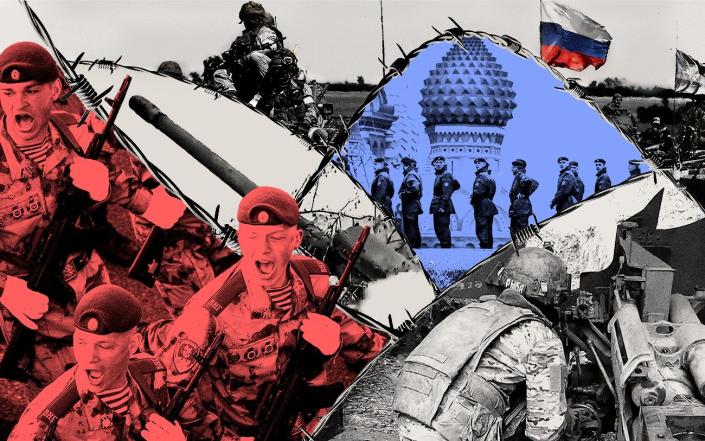No armour, no shoes, no hope – the daily life of a Russian soldier

Views (214)

With soaring casualty rates and plunging morale, Russian soldiers on Ukraine’s front line are paying a heavy price for Vladimir Putin’s decision to invade.
With soaring casualty rates and plunging morale, Russian soldiers on Ukraine’s front line are paying a heavy price for Vladimir Putin’s decision to invade.
Few soldiers on Ukraine’s front line get a decent night’s sleep, as shelling can last all night. Soldiers must also do round-the-clock watch shifts to guard their positions, which change constantly with the tides of battle.
If they’re lucky, they may be in an abandoned school with a basement to use as a bunker, or a house with a vegetable cellar. Otherwise it’s often an uncomfortable night in a trench in a forest, which sometimes has to be dug by hand.
Most soldiers anywhere near the front line have to sleep fully dressed, going for weeks without baths or showers. The closest they may get to a wash is a packet of wet-wipes for a quick scrub “down there”.
Even when clean, though, Russian uniforms are seldom a source of pride. Cheap Chinese-made boots often disintegrate, or come in different sizes in single pairs. Jackets aren’t warm enough; during the winter months, the mercury will sometimes not rise above freezing for weeks. Night temperatures of -10C are typical.
And as the war has ground on, new recruits have sometimes been given second-hand uniforms: the reason why their original owners no longer need them is not something many like to ask. Russia’s high command has insisted, however, that none of this is an excuse for sloppy dress standards.
Russian military kit has such a poor reputation that it has spawned a host of Ukrainian social media sites making fun of it. A YouTube channel hosted by Andrii Nebytov, the head of Kyiv’s police, highlights everything from Soviet-era helmets through to body armour that doesn’t stop bullets.
The average Russian soldier’s combat experience wouldn’t feel unfamiliar to veterans of the First World War. Much of it is relentless trench warfare, with battles raging for months for control of small towns and villages. Russian infantry are also dispatched on blind charges across no-man’s land, running headlong into machine gun fire in a desperate attempt to overwhelm Ukrainian positions.
The charges are nicknamed “Zombie Waves” by Ukrainian troops, who eschew the same tactic themselves. “Firstly, it’s inhumane, and, secondly, we don’t have enough men to waste like that,” says one. The Zombie Waves also help explain the soaring Russian casualty rates. According to a leaked assessment by America’s Defence Intelligence Agency, Russia has already suffered around 40,000 dead and 170,000 wounded, compared with 16,000 dead and 110,000 wounded for Ukraine.
To boost the Russian forces’ thinning ranks, military recruiters have been doing roadshows nationwide, promoting a stint on Ukraine’s front lines as “the choice of a real man”.
Those who sign a fixed-term contract can earn around 200,000 roubles (£2,000) a month – four times the rate pre-war. Similar pay rates apply for the 300,000 draftees called up in the “partial mobilisation” announced by Putin last September.
“They just charge straight at us, with no infantry discipline at all, and no sense of fear either,” says one US volunteer fighting alongside Ukrainian forces. “Quite often they keep going even after being shot a few times, which makes you wonder if they’re on drugs.”
Nearly 10,000 convicts are believed to have died fighting with Wagner already. Meanwhile, those who have survived and won their freedom have often caused havoc on returning to their hometowns, where they are seldom welcome because of their criminal pasts.
One Wagner fighter who received a pardon, ex-murderer Ivan Rossomakin, was arrested within days of returning home on suspicion of killing an elderly woman. Another boasted that his Wagner military service card now served as a get-out-of-jail-free card whenever he had a run-in with local police.
While no army’s military rations are known for being cordon bleu, the Russian offerings are a case in point. Designed to fuel a soldier through combat for 24 hours, the emphasis is on calories rather than taste. Choose from tinned barley porridge and canned bread through to ox meat, liver pate, and bacon chunks swimming in fat.
But overall, it’s little surprise that Russian troops frequently loot Ukrainian supermarkets, which are remarkably well stocked with local produce and fresh bread.
Morale has already plummeted, with masked soldiers airing grievances on social media. “We’re just sent in for slaughter,” says one. “The commanders are telling us in the face we’re disposable soldiers and our only chance to go back home is to get injured in fighting.”
The rot is gathering pace nonetheless. In a withering assessment last Sunday, Britain’s MoD claimed that Russia’s invasion force could no longer do major military operations, saying it was now made up mainly of “poorly trained mobilised reservists and increasingly reliant on antiquated equipment”.
While he carefully avoids criticising Putin by name, he has also made cryptic references to an all-powerful “happy grandpa” in the government, whose competence he is now beginning to doubt.
“How can we win this war if – by chance, and I’m just speculating here – it turns out that this grandpa is a complete ----head?”
That he gets away with such comments suggests the Kremlin knows he is speaking not just his own mind, but that of most Russian soldiers in Ukraine.
0 Likes
